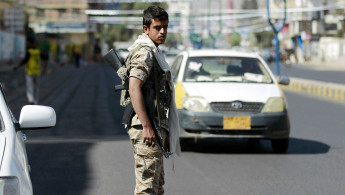Yemeni soldier killed in al-Qaeda attack on military checkpoint in Hadramawt
A soldier was killed and two others were wounded in an al-Qaeda attack on a checkpoint in Yemen's Hadramawt province on Monday, the army said.
Three assailants were also killed and two others injured in an exchange of gunfire that followed the attack in the southeastern province.
"A soldier was martyred and two soldiers were wounded in an attack by Al-Qaeda gunmen on our checkpoint near the Dowen military camp," said Major General Faraj al-Bahsani, a regional commander.
Militants remain active in the vast region of Hadramawt, where a number of leaders of Yemen's al-Qaeda in the Arabian Peninsula (AQAP) are based.
Since January, the United States has intensified its controversial air attacks on AQAP, which it considers the global terror network's most dangerous branch.
Al-Qaeda has flourished in Yemen, targeting government officials and security forces as the country's deadly two-year-old civil conflict shows no sign of waning.
In May, a Yemeni soldier was killed when a suspected al-Qaeda militant detonated a bomb vest in Hadramawt.
Six other people, including three civilians, were wounded when the suicide bomb targeted a checkpoint in the village of Duaan, some 300 kilometres (186 miles) north-west of the port city of Mukalla.
AQAP has carried out numerous attacks against both sides in the conflict, however the situation on the ground is much more nuanced. According to conflict analysts, Yemen's government has a history of secretly working with AQAP, using it for its own means.
It did so under former President Ali Abdullah Saleh and this clandestine relationship appears to have continued under Hadi.
When AQAP left the southern port city of Mukalla in April 2016, the Saudi-led coalition declared it a military success.
But reports said there was no fighting. Instead, Hadi's government negotiated with al-Qaeda fighters, allowing them a safe passage out of the city.
More than 10,000 people have been killed and 40,000 wounded since an Arab coalition led by Saudi Arabia joined the Yemen war in 2015, according to the UN's World Health Organization.
The coalition is allied with the UN-recognised government of President Abedrabbo Mansour Hadi, whose forces are battling Houthi rebels for control of the impoverished country.
Along with Sanaa, the rebels still control most of the north and the Red Sea coastline, including the key port of Hodeida.
The UN has warned Yemen is at risk of famine, with 17 million people facing dire food shortages. The country has also been hit by a cholera outbreak that has killed more than 780 people.





 Follow the Middle East's top stories in English at The New Arab on Google News
Follow the Middle East's top stories in English at The New Arab on Google News
![22 Arab countries at COP29 have rejected the targeting of fossil fuels [Getty]](/sites/default/files/styles/image_330x185/public/2024-11/GettyImages-2184289638.jpg?h=199d8c1f&itok=ptHl5bec)
![Dozens of people turned out for the funerals [Getty]](/sites/default/files/styles/image_330x185/public/2024-11/GettyImages-2185229760.jpg?h=e7c891e8&itok=1bctDcE6)
![The UAE is widely suspected of arming the RSF militia [Getty]](/sites/default/files/styles/image_330x185/public/2024-11/GettyImages-472529908.jpg?h=69f2b9d0&itok=Yauw3YTG)